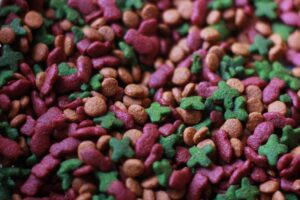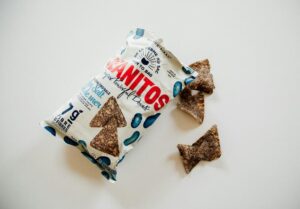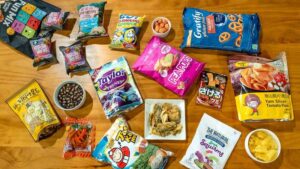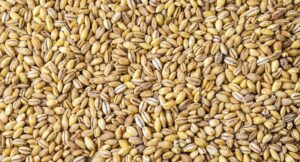Introduction
In the modern manufacturing world, packaging plays a very important role. It not only serves as a protection and preservation of products, but also acts as a key point of contact with consumers. With the advancement of technology, various types of packaging machinery have been developed to meet the needs of different industries.
The Malaysian packaging industry is showing positive growth, with the market value reaching RM3.89 billion in 2025 and expected to continue growing at a compound annual growth rate (CAGR) of 3.91% until 2033. The industry produced 20.8 billion units in 2023 and is projected to continue growing at a rate of over 2% until 2028.
The Importance of Packaging Machinery in Business
Effects Without Automation
Without advanced packaging equipment, businesses will face significant challenges:
- Increased operating costs – Reliance on manual labor only
- Longer production period – Low efficiency
- High risk of error – Lack of accuracy in manual processes
- High monitoring costs – Requires constant supervision
Advantages of Modern Packaging Machinery
Modern packaging machinery offers significant benefits in terms of:
- Speed and accuracy – Accurate and fast automation
- Consistent quality – Ensuring uniform product standards
- Waste reduction – More efficient use of materials
- Increased visual appeal – Attractive and professional packaging
6 Main Advantages of Packaging Machinery
1. Improved Efficiency
Packaging machinery significantly speeds up the product packaging process. Automated systems can handle thousands of products in a much shorter time than manual work, leading to increased production capacity and ensuring businesses can meet market demand promptly.
2. Uniformity and Standardization
The machine consistently produces packages with uniform weight, size and sealing. This standardized packaging increases brand credibility and ensures that consumers receive consistent product quality.
3. Long-Term Economic Benefits
While the initial outlay for a packaging machine may be large, the long-term financial benefits are significant. Automation reduces labor costs and optimizes material utilization, reducing waste and raw material expenses.
4. Security Improvement
Automation minimizes worker interaction with potentially hazardous packaging operations, reducing the risk of injury. Additionally, machinery ensures products are sealed in a clean environment, important for items such as food and pharmaceuticals.
5. Flexibility and Versatility
Contemporary packaging equipment is incredibly versatile. Many can be modified or adapted to suit a variety of products or packaging styles, allowing businesses to expand their offerings without a large investment in new machinery.
6. Reduction of Human Error
Properly maintained and calibrated machinery is less prone to errors than manual work. This precision results in reduced waste and a higher quality end product.
Industries That Need Packaging Machines
Food and Beverage Industry
Advanced packaging machinery is essential in streamlining processes such as bottling, sealing and labeling. The industry requires machines that can handle a wide range of products from beverages to snack.
Pharmaceutical Industry
The healthcare sector requires safe and hygienic packaging solutions. Advanced packaging machinery ensures accurate dosing and tamper-proof sealing of medicines.
Cosmetics and Personal Care Industry
For products such as creams and cosmetics, precision in dosage and aesthetic appeal are of utmost importance. This requires sophisticated packaging equipment specifically designed for this sector.
Agricultural Industry
The agricultural sector relies on packaging equipment for the systematic packaging and preservation of seeds, grains, and various agricultural goods.
Chemical Industry and Chemicals
Whether it’s household cleaning agents or industrial chemicals, strict packaging standards are essential to ensure consumer safety and regulatory compliance.
Types of Packaging Machines
Filling Machine
Liquid Filling Machine
This machine is common in the food and beverage, cosmetic, pharmaceutical and chemical industries. Based on the thickness and speed of the product flow, this machine can use the following methods:
- Gravity filler – Suitable for thin liquids such as water or juice
- Piston filler – For thick products such as tomato sauce, honey and lotions
- Vacuum filler – Ensures the filling is clean and foam-free, ideal for wine and pharmaceutical liquids
Powder Filling Machine
For ingredients such as flour, cocoa, protein powder or baby formula, these machines rely on auger-based dosing that uses a rotating screw to measure and feed the correct amount of powder into the container.
Granule/Solid Filling Machine
To package coffee beans, grains, nuts, pet food or candy, these machines rely on multi-head weighers, volumetric cup fillers or gravity feeding systems.
Sealing Machine
Heat Sealing
Using heat and pressure to fuse layers of plastic or thermoplastic materials, creating the tight seal needed to keep products safe and undamaged.
Induction Sealing
Designed to create a seal that indicates whether a product has been opened, using electromagnetic induction to heat the foil liner inside the lid.
Capping Machine
Automate the process of placing caps on bottles with a consistent amount of torque and speed, able to handle a wide variety of cap types with high accuracy.
Vacuum Sealer
Removes air from packaging and creates an airtight seal, helping to stop oxidation and keeping food fresher for longer.
Wrapping Machine
Shrink Wrapping
Using heat to tightly seal the product using plastic film, which operates in conjunction with a shrink tunnel to make the film shrink uniformly.
Stretch Wrap
Used primarily to secure and consolidate pallet loads by wrapping stretch wrap around them, it is essential to keep products safe during transport.
Flow Wrap (HFFS)
Wraps individual items in a continuous packaging flow, using a single roll of film and sealing it at both ends.
Form Fill Sealing Machine (FFS)
Vertical FFS (VFFS)
Suitable for packaging powders, granules, liquids and small solids, pulling the film roll vertically to form a pouch, ejecting the product and sealing the bag.
Horizontal FFS (HFFS)
Suitable for solid or fragile products that need to be placed horizontally, taking a roll of film and forming it into a package horizontally.
Labeling Machine
Flat and Side Labelers
Built to attach labels to the sides or flat areas of rectangular or square packages, with an adjustable applicator and vision system for precise placement.
Round Bottle Labeler
Designed for applying labels to bottles, jars and tubes, ensuring branding and product information are neatly aligned without wrinkles.
End-of-Line Packaging Machinery
Sender
Allows for product movement through the packaging process, adjustable for different speeds, directions and load types.
Case Packaging
Enables automatic packaging of products into boxes or cartons, increasing speed and accuracy in the packaging process.
Case Sealing
Closing and sealing boxes with tape or heat sealing after the products are placed, ensuring each case is sealed in a consistent manner.
Palletizers
Arranging cases or finished products in a regular and secure pattern on pallets, facilitating the work of staff and ensuring that goods are transported safely.
Cost of Packaging Machine in Malaysia
Price Range By Category
Entry Level Machine
- Price : RM20,000 – RM60,000
- Type : Semi-automatic sealing, small filling machine
- Suitable for : Small businesses and startups
Mid-Range Machine
- Price : RM80,000 – RM200,000
- Type : Form-fill-seal machine, automatic labeling machine
- Suitable for : Medium businesses with higher production needs
Fully Automated Machine
- Price : RM400,000 and above
- Type : High-speed VFFS system, robotic palletizer
- Suitable for : Large-scale industries with high production requirements
Factors Affecting Price
| Factor | Description | Cost Impact |
| Machine Type | Different machines have different functions. | High |
| Automation Level | Fully automatic vs semi-automatic machines | Very High |
| Production Capacity | High vs low volume machines | High |
| Advanced Features | Touch screen interface, programmable controls | Medium |
| Build Quality | High quality materials and components | High |
| Brand | Famous brands vs lesser-known brands | Medium |
| Compliance | Specific industry standards (FDA, CE) | Medium |
Characteristics of the Best Supplier
Product Quality
- Certification : ISO, CE, FDA
- Warranty : Minimum 1 year
- Technical support : 24/7 or as needed
After-Sales Service
- Training : For machine operators
- Maintenance : Regular and emergency schedules
- Spare parts : Long-term availability
Technical Support
- Installation : Professional and on time
- Consultation : Selection of the appropriate machine
- Repair : On-site or on-premise
Conclusion
Packaging machinery plays a vital role in Malaysia’s dynamic commercial landscape. With industry growth expected to be positive and an increasing emphasis on automation and sustainability, investing in the right packaging machinery is critical for long-term business success.
For new businesses, there are compact, cost-effective machinery options that offer scalability and adaptability. For established firms, advanced packaging systems are available to efficiently manage large-scale operations, ensuring consistent and fast production continuity.
The right selection of packaging machinery, along with proper maintenance and reliable supplier support, will help Malaysian businesses remain competitive in an increasingly challenging global market.









